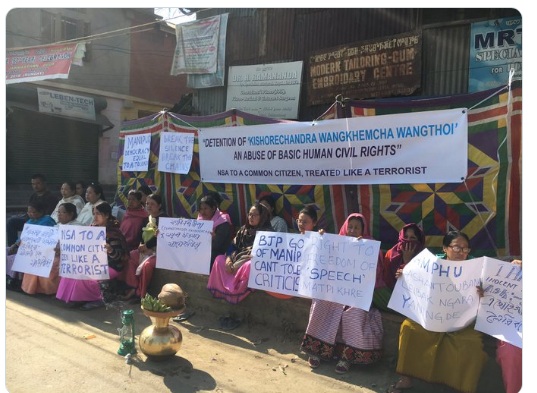Civil Liberties
https://www.newsclick.in/Govt-Raids-on-Newsclick-Our-Voice-Cant-be-Muzzled
It has become a routine practice with the present government to deploy government-controlled agencies to deal with all those who disagree with and criticise the government. In the past, the income tax department, the ED, various Central investigative agencies like the Central Bureau of Investigation and National Investigation Agency, have been selectively used in this manner against a range of people – from journalists to political leaders, to even farmers’ leaders.
The whole panoply of the legal instruments available with the government have been deployed for such politically motivated coercive actions, including filing cases of sedition, defamation, harming harmony, breach of peace, etc. under the Indian Penal Code, and use of other laws like the Disaster Management Act, the draconian Unlawful Activities (Prevention) Act (UAPA), the Information Technology Act, and others.
Prime Time With Ravish Kumar https://www.youtube.com/watch?v=hvzZo-f7Iq8 - February 9, 2021:Many kinds of movements are taking place within the Farmers Protest. A movement is also about the release of the arrested people. The police have a hundred arguments to arrest an agitator. The matter of the release of everyone is not able to gain prominence and even after getting the place, the release does not matter. It is obvious that going into a movement and practicing democracy is risky. Those who have never been in any movement should understand that voting is not the only task. That is a day's work and a few hours' work. A bigger task than that is to monitor and question the decisions and actions of governments for five years. Also for his right and for the rights of others.
Noudeep Kaur..
किसान आंदोलन (Farmers Protest) के भीतर कई तरह के आंदोलन हो रहे हैं. एक आंदोलन गिरफ्तार लोगों की रिहाई को लेकर भी है. किसी आंदोलनजीवी को गिरफ्तार करने के लिए पुलिस के पास सौ दलीलें होती हैं. सभी की रिहाई की बात प्रमुखता से जगह हासिल नहीं कर पाती है और जगह मिलने के बाद भी रिहाई पर फर्क नहीं पड़ता है. ज़ाहिर है किसी आंदोलन में जाकर लोकतांत्रिकता का अभ्यास करते रहना जोखिम भरा काम है. जो कभी किसी आंदोलन में नहीं गए हैं उन्हें यह समझना चाहिए कि मतदान करना एकमात्र काम नहीं है. वो एक दिन का और कुछ घंटों का काम है. उससे कहीं ज़्यादा बड़ा काम है पांच साल तक सरकारों के फैसलों और कार्यों पर नज़र रखना और सवाल करना. अपने अधिकार के लिए भी और दूसरों के अधिकार के लिए.
https://www.youtube.com/watch?v=hvzZo-f7Iq8
Panel Discussion on Resisting Dispossession
https://www.facebook.com/ResistingDispossession/videos/687520065509233
https://twitter.com/superfan_nav/status/1358193897441271812
Nav Bhatia asks When did basic Human Rights become a debate topic?
When did it become a topic that required choosing a side?

Why our criminal justice system urgently needs a law for compensation for those under illegal detention BYAISHWARYA MEHTA https://www.theleaflet.in/why-our-criminal-justice-system-urgently-needs-a-law-for-compensation-for-those-under-illegal-detention/
JULY 1, 2021
the jurisprudence on this matter, the Supreme Court has (correctly) held the State responsible for the tortious acts of its employees, which in these cases, are the police, especially where there has been a violation of fundamental rights due to the abuse of powers given to police officials.
In our country, unfortunately, instances of such misuse of power by police officials, including illegal detention, custodial deaths, brutality, and torture are fairly routine. However, to date there is no set of guidelines issued by the court regarding the calculation of the quantum of compensation to be awarded.
Furthermore, wrongful arrests lead to the violation of not only the arrestee’s rights, but also accrue net harm to the entire society. This manifests in multiple forms: the actual offender being at large within society, free to commit more offences; the drop in tax revenue due to the arrestee being denied the opportunity to work; the additional expenditure on the maintenance of the detainee in prison; the addition to the backlog of cases pending before an overburdened judiciary.
The Lost Right to Compensation of Wrongfully Convicted Victims: A Critique https://www.lawctopus.com/academike/the-lost-right-to-compensation-of-wrongfully-convicted-victims-a-critique/ November 1, 2020 Eleen Garg, Amity Law School, Delhi
The Indian judicial system has demonstrated a lack of accountability by failing to repay citizens who have been jailed on false charges. The non-uniform approach adopted by Judiciary has further worsened their disorderly situation.
PIL is seen as an efficient method against the State’s lack of knowledge. However, factors such as illiteracy, poverty, lack of legal identity, social condemnation, and lack of quality legal assistance often act as an impediment in access to justice for poor, which manifests the ailing condition of the legal system of poverty-stricken India.
Journalist, activist, re-arrested under National Security Act for Facebook posts on deceased BJP leader https://www.tribuneindia.com/news/nation/journalist-activist-re-arrested-under-national-security-act-for-facebook-posts-on-deceased-bjp-leader-254703 The Manipur Police has re-arrested journalist Kishorchandra Wangkhem and activist Erendro Leichombam under the National Security Act (NSA) after they had been granted bail for an earlier arrest for their allegedly derisive social media posts on state BJP chief S Tikendra Singh, following his demise due to COVID-19 last week. ..The BJP state vice-president Usham Deban Singh and general secretary P Premananda Meetei filed a complaint against Wangkhem and Leichombam, after which the police picked them up from their residences here.
Manipur High Court Orders Release of Journalist Detained Under NSA Over Facebook Post On Cow Dung Cure For COVID https://www.livelaw.in/news-updates/manipur-high-court-orders-interim-release-of-journalist-kishorchandra-wangkhemcha-178003 Shrutika Pandey23 July 2021 His detention would be as much a violation of Article 21 of the Constitution as it was in the case of Erendro Leichombam.

- Singing Faiz's 'Hum Dekhenge' is 'Sedition': Nagpur Police Book Organisers of Vira Sathidar Memorial
- The Law Commission's Report on Sedition Misunderstands What the Courts Said
- Law Commission Says Sedition Law Should Stay, Recommends Increased Punishment
- The Seditious Republic
- Understanding Sedition
- Sedition: Hold the celebrations.
- Post Sedition Syndrome
- Sedition Law under Consideration
- Government speak on Sedition
- The Story of Sedition in India
- ‘Sedition’ Must Go!
- Historic Supreme Court decision on sedition law
- Personal Liberty and the Indian Courts

